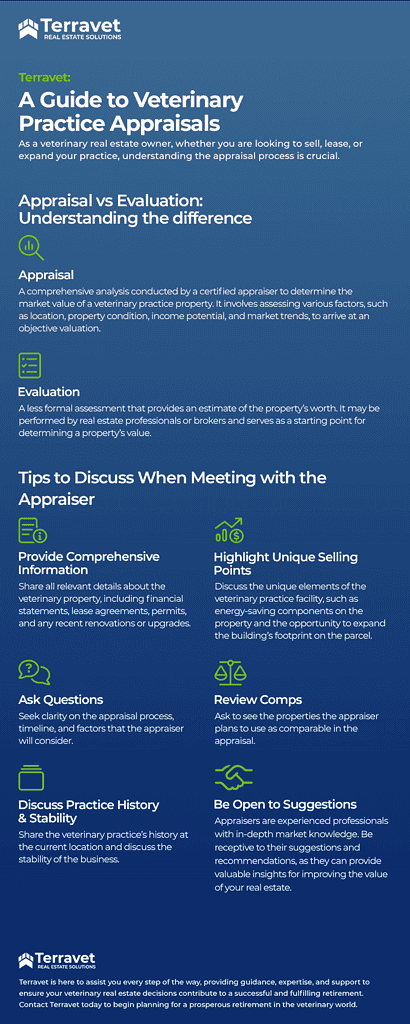As a veterinary real estate owner, whether you are looking to sell, lease, or expand your practice, understanding the appraisal process is crucial. In this article, we will explore the differences between appraisals and evaluations, discuss how to appraise a veterinary practice, highlight factors considered during the process, and provide essential tips for discussing matters with an appraiser. We will also explain how Terravet’s experienced professionals can assist you in making informed decisions.
Appraisal vs. Evaluation: Understanding the Difference
While the terms “appraisal” and “evaluation” are sometimes used interchangeably, they have distinct meanings within the context of veterinary practice real estate:
- Appraisal: An appraisal is a comprehensive analysis conducted by a certified appraiser to determine the market value of a veterinary practice property. It involves assessing various factors, such as location, property condition, income potential, and market trends, to arrive at an objective valuation.
- Evaluation: On the other hand, an evaluation is a less formal assessment that provides an estimate of the property’s worth. It may be performed by real estate professionals or brokers and serves as a starting point for determining a property’s value.
The Purpose of a Veterinary Real Estate Appraisal
The purpose of veterinary real estate appraisal (and evaluation) is to provide valuable insights into the performance, value, and viability of real estate. These processes help veterinary professionals and property owners make informed decisions, plan strategically, identify areas for improvement, and determine fair market values. Whether it’s evaluating a practice for potential growth or appraising real estate for financing or sale, understanding the true worth is vital.
How to Appraise a Veterinary Practice
Appraising a veterinary practice requires a systematic approach to ensure an accurate assessment. Here are the key steps involved:
- Engage a Qualified Appraiser: Seek the services of a licensed appraiser, preferably with experience in appraising veterinary real estate. Research reputable appraisers and ensure they have the necessary credentials and expertise.
- Gather Information: The appraiser will collect essential data, including financial statements, property details, lease agreements, and any other relevant documents. This information provides insights into the real estate’s financial performance and helps determine its value.
- Property Inspection: The appraiser will conduct an on-site inspection to assess the condition and layout of the property. They will evaluate factors such as excess land for additional development, property condition, age of building, and positioning within the local market geography.
- Market Analysis: The appraiser will analyze market conditions, including comparable sales and rental rates of similar properties in the area. This information helps determine how the property stacks up against the competition and influences its market value.
Tips to Discuss When Meeting with the Appraiser
Preparing for a meeting with the appraiser is essential to ensure a productive discussion and ensure accurate appraisal results. Consider the following tips:
- Provide Comprehensive Information: Share all relevant details about the veterinary property, including financial statements, lease agreements, permits, and any recent renovations or upgrades.
- Highlight Unique Selling Points: Discuss the unique elements of the veterinary practice facility, such as energy-saving components on the property and the opportunity to expand the building’s footprint on the parcel. These factors can positively influence the appraiser’s assessment.
- Ask Questions: Seek clarity on the appraisal process, timeline, and factors that the appraiser will consider. Understanding their methodology and approach will help you better comprehend the final valuation.
- Review Comps: Ask to see the properties the appraiser plans to use as comparable in the appraisal. Provide insights on why certain properties may or may not be suitable as comparative properties, especially if the appraiser selects non-veterinary real estate as comps.
- Discuss Practice History and Stability: Share the veterinary practice’s history at the current location and discuss the stability of the business. Consider emphasizing the longevity and future expectations of the practice when determining real estate value.
- Be Open to Suggestions: Appraisers are experienced professionals with in-depth market knowledge. Be receptive to their suggestions and recommendations, as they can provide valuable insights for improving the value of your real estate.
Check out this infographic for a visual guide of the discussion points.

Conclusion
As a veterinary real estate owner, understanding the appraisal and evaluation process is crucial for making informed decisions regarding your property. At Terravet, we’re here to offer our expert support and guidance, by providing the appropriate information needed for negotiating the best possible arrangements for veterinary real estate owners. Our team of experts can help you navigate the complexities of determining the market value of your property, whether you are looking to sell, lease, or expand. Contact Terravet today to benefit from our professional expertise and ensure you receive the most accurate and reliable valuation for your veterinary practice real estate.



